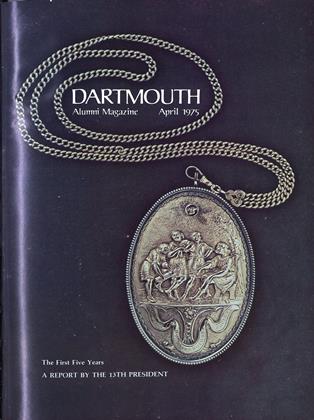A REPORT BY THETHIRTEENTH PRESIDENT
Shortly after being elected President of Dartmouth College, I had an exchange with, I an old friend. He offered his condolences and bemoaned the fact that I would have to spend most of my time dealing with student unrest. I replied that I Was quite sure he was wrong. Having always had close and good relations with students I was not concerned about the problem of unrest. I predicted that my number one problem would be coeducation.
Reflecting on the past five years, I recognize that my response to my friend was only partly correct. I was right in saying that I would not have problems with student unrest, and I was right in the short run to say that coeducation would be the number one issue. Now, however, both of these issues have faded as the financial malaise of the nation and of higher education overshadows all other problems.
The Chinese have long recognized that years have distinctive characteristics, and they have a custom of assigning such colorful names as "The Year of the Dragon." As I look back on the last five years, I feel that each had a distinctive characteristic.
My expectation was that 1970 would be the year in which a new President tried out his ideas. And while this was partially true, I also learned a great deal that I had not previously understood about the College, including the difficulty of making significant changes in a hurry! In any case that year was overshadowed by outside events, and I will always remember it as "The Year of Cambodia and Kent State."
May 1970 saw the coincidence of two events that shook our country, the incursion into Cambodia and the shootings at Kent State University. Campuses all over the nation erupted. We were most fortunate on the Dartmouth campus that, while feelings were as deep as those at any other institution, the reaction was highly responsible, and we set a national example. It is one of the ironies of that period that because our campus reacted effectively and responsibly - but without violence Dartmouth received very little public recognition from the media. While many other campuses were deeply divided and scars were inflicted which would take years to heal, we witnessed a strong pulling together of the Dartmouth community in which I take pride and which was most beneficial for the institution.
Since the nation was once so divided over these issues, it is appropriate from a perspective of five years to reconsider the two events that triggered campus explosions. As we see what has happened to the small and peaceful state of Cambodia, and as much more has come to light about the shootings at Kent State, was the nationwide student outrage unreasonable?
Nineteen seventy-one was very clearly "The Year of the Coed Debate." More than two years of planning, discussion, and polling of constituencies came to a conclusion with the Trustee decision near the end of that year. So drastic a change in a 200-year-old institution was bound to raise emotions enormously. It is therefore a matter of great satisfaction that this change was achieved without splitting the Dartmouth family. Everything that has happened since that time reinforces my conviction that the Trustees made the right decision for the future welfare of the College.
Nineteen seventy-two was "The Year of Implementation." We had a few short months to prepare the campus to implement two ambitious new endeavors, coeducation and the Dartmouth Plan. For me it was the happiest of the five years. While the beginnings of very serious financial problems could be sensed, no one yet saw the magnitude of the threat. There was a great sense of excitement on the campus that carried with it both the faculty and the students. We were gratified by the significant increase in applications to Dartmouth and by the quality of the women students we attracted.
I will always think of 1973 as "The Year of the Medical School." For a variety of reasons, recounted later in this report, I devoted roughly half of my time to the problems of the Medical School and the Medical Center. Of all the challenges I have faced so far, I feel that this is the one for which my past experience had prepared me least. Therefore, this year was an intensive learning experience for me. I now understand why a past president of Princeton once told his Ivy colleagues that Princeton's secret weapon was that it did not have a medical school. Nineteen seventy-four was "The Year of the Budget." Starting with the quadrupling of oil prices, it saw the Dow Jones drop below 600 and ended with the Trustees concluding that a major cut had to be made in the budget of the College. It was a year when many of us had to spend a totally disproportionate amount of our time worrying about money.
The purpose of this report is to recount these five eventful years in some detail. At the end I shall speculate on the near future of the College. I have never been one to peek to the end of a book to see how the story comes out, but I would give a great deal to know by what names the next five years will be remembered. It would be enormously reassuring if someone could guarantee that none of them will be "The Year We Ran Out of Money," and that at least one of them will be "The Year We Concentrated on Academic Issues."















